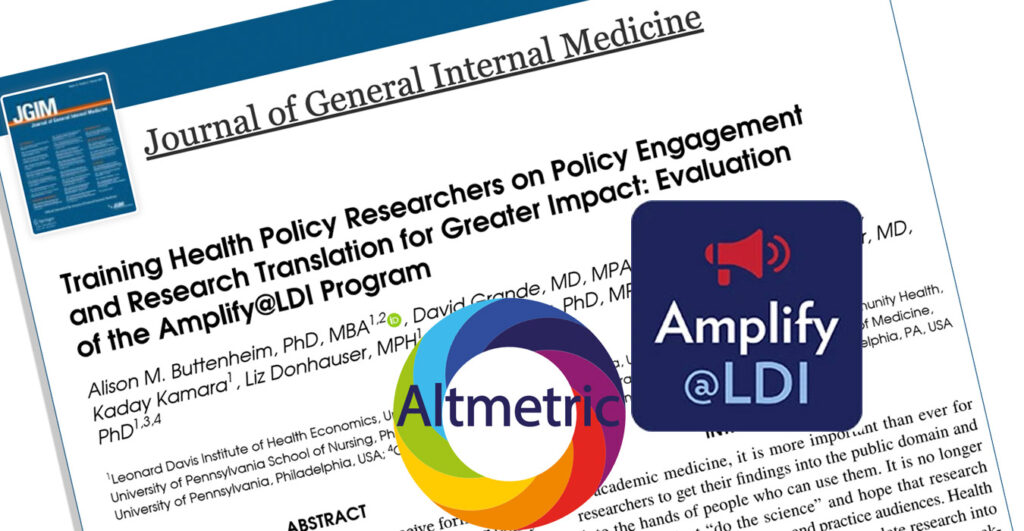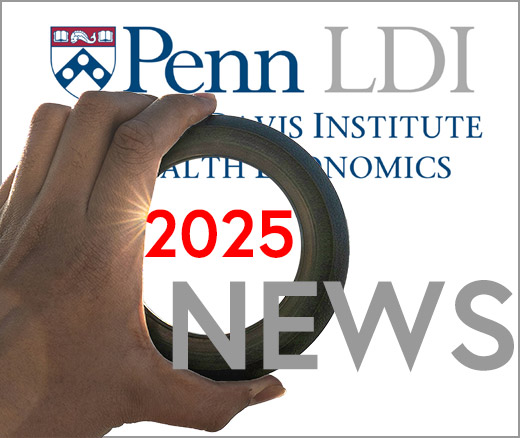
How Playing Games May Save People’s Lives
The Growing Use of Gamification in Health Motivates People to Exercise More and Take Other Actions to Improve Their Physical Well-Being
News

A new study published in the Journal of General Internal Medicine (JGIM) documents how a program at the University of Pennsylvania’s Leonard Davis Institute of Health Economics (LDI) enabled Penn academic researchers to increase the media mentions of their work by 177%.
LDI is a hub of health services research within the University and provides several support programs and services for the more than 400 Penn faculty members who are LDI Senior Fellows. Launched in 2020, the Amplify@LDI curriculum is designed to teach skills that will increase the visibility of researchers’ work through translation and dissemination activities.

Using Altmetric scores, the study analyzed how many media mentions were logged for the research outputs of Amplify@ LDI participants compared to two other groups of similar researchers who were not participants.
The results showed that during the year of their training, Amplify@LDI participants’ Altmetric scores increased by 177%. During the same period, the Altmetrics scores of the first comparison group decreased by 27% and those of the second comparison group increased by only 32%.
“We were really struck by these results,” said Alison Buttenheim, PhD, MBA, a Professor of Nursing and Health Policy at Penn and LDI’s Director of Engagement. “While we can, and do, evaluate the impact of the Amplify program in multiple dimensions, the boost in Altmetric scores associated with program participation provides a strong signal that participants are gaining new translation and dissemination skills and then deploying those to expand the reach of their science.”
Altmetric, is a London-based data science company that tracks the online media mentions of scientific journal articles across more than 5,000 global news outlets. This includes mentions of a study’s findings in online newspapers, magazines, social media sites and other mainstream news platforms. The Altmetric system compiles a real-time numeric score of mentions for each research paper.
As digital technologies and social media have come to dominate and accelerate the daily spread of scientific information in recent years, granting agencies like the National Institutes of Health (NIH) have increasingly required researchers’ applications to include specific dissemination plans designed to make the research findings known to broader audiences. These trends and requirements have challenged many academic researchers whose prior formal training did not include such things as how to collaborate with print or broadcast journalists, engage with government policymakers, or author op-eds or articles in a vernacular suitable for publication in newspapers, magazines, and other general circulation national media.
Amplify@LDI is a program of six intense sessions occurring over six months in which researchers are brought together with working journalists, public relations consultants, social media experts, writing coaches, and veteran policymakers as instructors.
The program’s lessons and exercises teach faculty members how to engage with newsrooms and social media, and write op-eds linked to current health care research-related events. Participants can also learn how to use whiteboard animations, participate in podcasts, create social media video reels, and reach out to engage with policymakers at the municipal, state, and federal level.
The in-person Amplify@LDI program is free for LDI Senior Fellows. A separate, related Amplify@LDI resource is Amplify@LDI: Translating Research for Impact, an online introduction course to the same subject matter. This online instruction module is open to the public and is free after registration.

The Growing Use of Gamification in Health Motivates People to Exercise More and Take Other Actions to Improve Their Physical Well-Being

Pa.’s New Bipartisan Tax Credit is Designed to be Simple and Refundable – Reflecting Core Points From Penn LDI Researchers Who Briefed State Leaders

Focusing in on Some of Health Care Policy’s Most Urgent Issues

Highlighting 10 Ways LDI Fellows Put Their Research Into Action

From AI-Powered Public Health Messaging to Stark Divides in Child Wellness and Medicaid Access, LDI Experts Highlight Urgent Problems and Compelling Solutions

An LDI Expert Offers Three Recommendations That Address Core Criticisms of the ACA’s Model